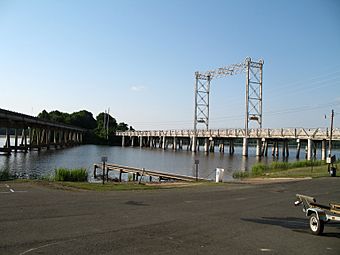Caddo Lake Drawbridge facts for kids
Quick facts for kids |
|
|
Caddo Lake Bridge
|
|

Caddo Lake Drawbridge in 2007
|
|
| Location | Across Caddo Lake, next modern LA 538 bridge, Mooringsport, Louisiana |
|---|---|
| Area | less than one acre |
| Built | 1914 |
| Architect | Waddell & Harrington; Midland Bridge Co. |
| NRHP reference No. | 96001166 |
| Added to NRHP | October 18, 1996 |
The Historic Caddo Lake Drawbridge, also called the Mooringsport Bridge, is a special kind of bridge. It's a vertical-lift bridge, which means part of it can move straight up! This bridge is so important that it's listed on the U.S. National Register of Historic Places. It was built in 1914 by the Midland Bridge Company to replace an old ferry. The part that lifts hasn't worked since the 1940s.
Contents
A Special Bridge Design
This bridge shows off a cool design called "Vertical-Lift." It was created by John Alexander Low Waddell and his company, Waddell & Harrington. This design was very clever. It let the whole middle part of the bridge lift straight up. This was important for tall boats and equipment, like oil company machines, to pass underneath.
The "Vertical-Lift" design was first invented in 1893. It was used successfully in Chicago for the South Halsted Street Bridge. The Caddo Lake Drawbridge is a direct descendant of that first amazing bridge.
Generals and Flour Bombs
Something exciting happened at the bridge in the summer of 1941. This was just before World War II began. The United States Army held practice exercises near Mooringsport. They were getting soldiers ready for war.
During these exercises, two very famous generals came to Mooringsport. They were Dwight D. Eisenhower and George S. Patton. They led two groups of soldiers, called the Red and Blue armies. Their mission was to "capture" the bridge. They even "bombed" the bridge with sacks of flour!
Changes Over Time
In the mid-1940s, the bridge's ownership changed. It went from Caddo Parish to the Louisiana Department of Highways. Soon after, the Department of Highways realized the bridge didn't need to open anymore. So, they took out the heavy concrete weights that helped the bridge lift. They dropped them into the lake.
In the late 1970s, the bridge was quite narrow. Only one lane of traffic could cross at a time. Cars had to take turns. The Department of Highways thought the bridge was too old and needed to be replaced.
Saving the Historic Bridge
In 1989, money was set aside to build a new bridge. The plan was to build a new two-lane bridge next to the old one. Once the new bridge was finished, the old historic bridge was supposed to be torn down.
But citizens launched a campaign to save it! Local, state, and federal officials got involved. They wanted to turn the old bridge into a walkway, a landmark, and a tourist spot. After two years of talks, everyone agreed. Instead of tearing it down, they would use the money to fix up the old bridge.
This agreement had one condition: Caddo Parish had to take ownership of the bridge. On June 26, 1991, the Caddo Parish Commissioners voted to accept the bridge. It became part of the Caddo Parish Department of Parks and Recreation.
A National Treasure
On July 24, 1991, experts from the Historic American Engineering Record studied the bridge. They said the bridge was very important to the whole country. This was because of its designer, its special design, and the fact that it was the only one of its kind left in Louisiana.
Because of this, the bridge could be added to the National Register of Historic Places. However, a state law caused a delay. The bridge couldn't be nominated until its ownership changed.
After the bridge was cleaned, painted, and closed to cars, Caddo Parish officially took ownership on October 3, 1995. A special ceremony was held to celebrate saving this important landmark. On June 4, 1996, a public meeting took place to discuss nominating the bridge. Finally, on October 18, 1996, the Historic Caddo Lake Drawbridge was officially added to the National Register of Historic Places.


